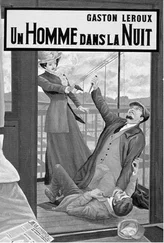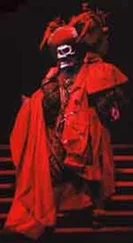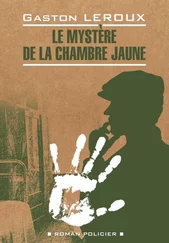A moment later, the tapestry portière was raised, and the gypsy appeared on the threshold of the chamber, blushing, confused, breathless, her large eyes drooping, and not daring to advance another step.
Bérangère clapped her hands.
Meanwhile, the dancer remained motionless upon the threshold. Her appearance had produced a singular effect upon these young girls. It is certain that a vague and indistinct desire to please the handsome officer animated them all, that his splendid uniform was the target of all their coquetries, and that from the moment he presented himself, there existed among them a secret, suppressed rivalry, which they hardly acknowledged even to themselves, but which broke forth, none the less, every instant, in their gestures and remarks. Nevertheless, as they were all very nearly equal in beauty, they contended with equal arms, and each could hope for the victory.—The arrival of the gypsy suddenly destroyed this equilibrium. Her beauty was so rare, that, at the moment when she appeared at the entrance of the apartment, it seemed as though she diffused a sort of light which was peculiar to herself. In that narrow chamber, surrounded by that sombre frame of hangings and woodwork, she was incomparably more beautiful and more radiant than on the public square. She was like a torch which has suddenly been brought from broad daylight into the dark. The noble damsels were dazzled by her in spite of themselves. Each one felt herself, in some sort, wounded in her beauty. Hence, their battle front (may we be allowed the expression,) was immediately altered, although they exchanged not a single word. But they understood each other perfectly. Women’s instincts comprehend and respond to each other more quickly than the intelligences of men. An enemy had just arrived; all felt it—all rallied together. One drop of wine is sufficient to tinge a glass of water red; to diffuse a certain degree of ill temper throughout a whole assembly of pretty women, the arrival of a prettier woman suffices, especially when there is but one man present.
Hence the welcome accorded to the gypsy was marvellously glacial. They surveyed her from head to foot, then exchanged glances, and all was said; they understood each other. Meanwhile, the young girl was waiting to be spoken to, in such emotion that she dared not raise her eyelids.
The captain was the first to break the silence. “Upon my word,” said he, in his tone of intrepid fatuity, “here is a charming creature! What think you of her, fair cousin?”
This remark, which a more delicate admirer would have uttered in a lower tone, at least was not of a nature to dissipate the feminine jealousies which were on the alert before the gypsy.
Fleur-de-Lys replied to the captain with a bland affectation of disdain;—“Not bad.”
The others whispered.
At length, Madame Aloise, who was not the less jealous because she was so for her daughter, addressed the dancer,—“Approach, little one.”
“Approach, little one!” repeated, with comical dignity, little Bérangère, who would have reached about as high as her hips.
The gypsy advanced towards the noble dame.
“Fair child,” said Phoebus, with emphasis, taking several steps towards her, “I do not know whether I have the supreme honor of being recognized by you.”
She interrupted him, with a smile and a look full of infinite sweetness,—
“Oh! yes,” said she.
“She has a good memory,” remarked Fleur-de-Lys.
“Come, now,” resumed Phoebus, “you escaped nimbly the other evening. Did I frighten you!”
“Oh! no,” said the gypsy.
There was in the intonation of that “Oh! no,” uttered after that “Oh! yes,” an ineffable something which wounded Fleur-de-Lys.
“You left me in your stead, my beauty,” pursued the captain, whose tongue was unloosed when speaking to a girl out of the street, “a crabbed knave, one-eyed and hunchbacked, the bishop’s bellringer, I believe. I have been told that by birth he is the bastard of an archdeacon and a devil. He has a pleasant name: he is called Quatre-Temps (Ember Days), Paques-Fleuries (Palm Sunday), Mardi-Gras (Shrove Tuesday), I know not what! The name of some festival when the bells are pealed! So he took the liberty of carrying you off, as though you were made for beadles! ‘Tis too much. What the devil did that screech-owl want with you? Hey, tell me!”
“I do not know,” she replied.
“The inconceivable impudence! A bellringer carrying off a wench, like a vicomte! a lout poaching on the game of gentlemen! that is a rare piece of assurance. However, he paid dearly for it. Master Pierrat Torterue is the harshest groom that ever curried a knave; and I can tell you, if it will be agreeable to you, that your bellringer’s hide got a thorough dressing at his hands.”
“Poor man!” said the gypsy, in whom these words revived the memory of the pillory.
The captain burst out laughing.
“Corne-de-boeuf! here’s pity as well placed as a feather in a pig’s tail! May I have as big a belly as a pope, if—”
He stopped short. “Pardon me, ladies; I believe that I was on the point of saying something foolish.”
“Fie, sir” said la Gaillefontaine.
“He talks to that creature in her own tongue!” added Fleur-de-Lys, in a low tone, her irritation increasing every moment. This irritation was not diminished when she beheld the captain, enchanted with the gypsy, and, most of all, with himself, execute a pirouette on his heel, repeating with coarse, naïve, and soldierly gallantry,—
“A handsome wench, upon my soul!”
“Rather savagely dressed,” said Diane de Christeuil, laughing to show her fine teeth.
This remark was a flash of light to the others. Not being able to impugn her beauty, they attacked her costume.
“That is true,” said la Montmichel; “what makes you run about the streets thus, without guimpe or ruff?”
“That petticoat is so short that it makes one tremble,” added la Gaillefontaine.
“My dear,” continued Fleur-de-Lys, with decided sharpness, “You will get yourself taken up by the sumptuary police for your gilded girdle.”
“Little one, little one;” resumed la Christeuil, with an implacable smile, “if you were to put respectable sleeves upon your arms they would get less sunburned.”
It was, in truth, a spectacle worthy of a more intelligent spectator than Phoebus, to see how these beautiful maidens, with their envenomed and angry tongues, wound, serpent-like, and glided and writhed around the street dancer. They were cruel and graceful; they searched and rummaged maliciously in her poor and silly toilet of spangles and tinsel. There was no end to their laughter, irony, and humiliation. Sarcasms rained down upon the gypsy, and haughty condescension and malevolent looks. One would have thought they were young Roman dames thrusting golden pins into the breast of a beautiful slave. One would have pronounced them elegant grayhounds, circling, with inflated nostrils, round a poor woodland fawn, whom the glance of their master forbade them to devour.
After all, what was a miserable dancer on the public squares in the presence of these high-born maidens? They seemed to take no heed of her presence, and talked of her aloud, to her face, as of something unclean, abject, and yet, at the same time, passably pretty.
The gypsy was not insensible to these pin-pricks. From time to time a flush of shame, a flash of anger inflamed her eyes or her cheeks; with disdain she made that little grimace with which the reader is already familiar, but she remained motionless; she fixed on Phoebus a sad, sweet, resigned look. There was also happiness and tenderness in that gaze. One would have said that she endured for fear of being expelled.
Phoebus laughed, and took the gypsy’s part with a mixture of impertinence and pity.
Читать дальше









